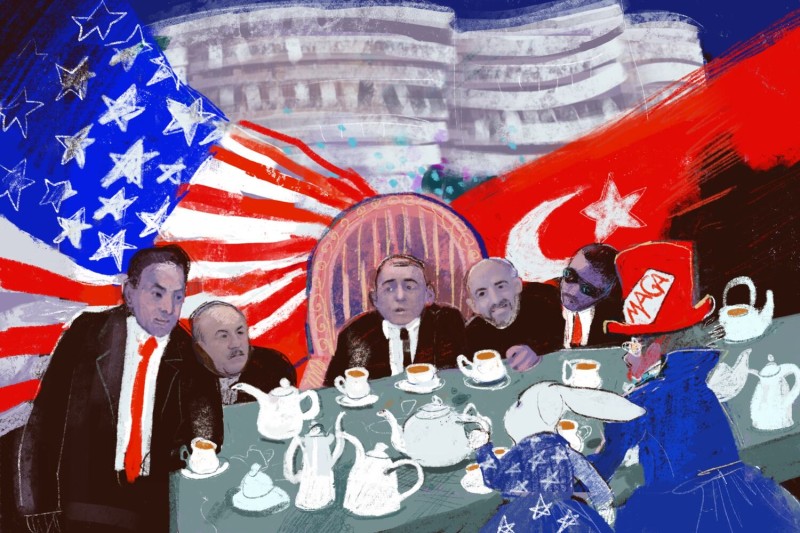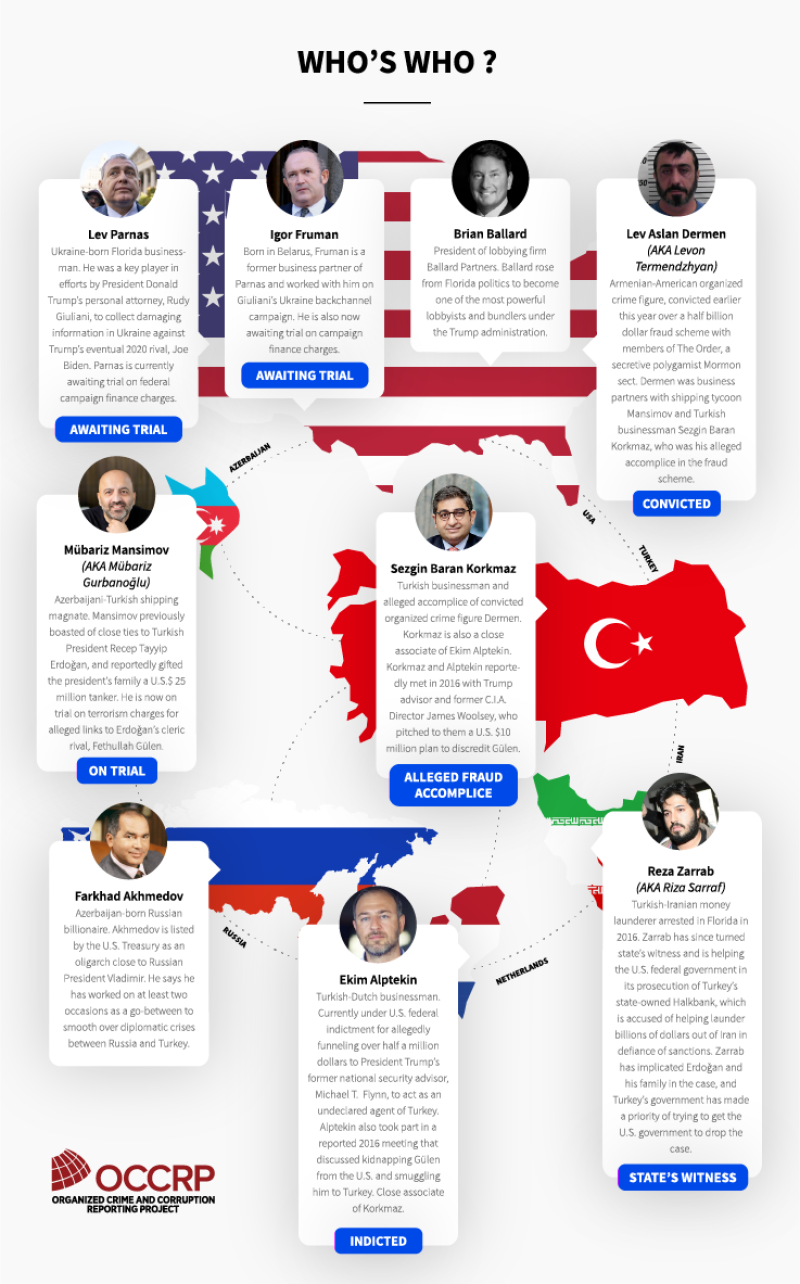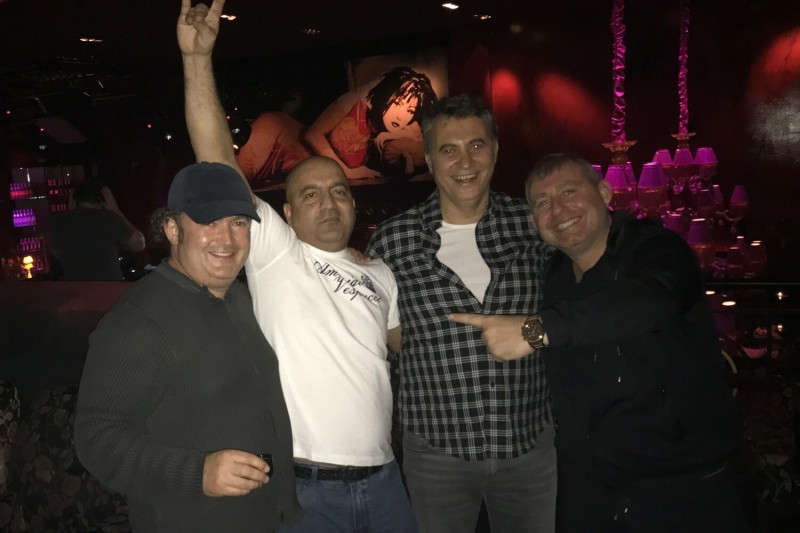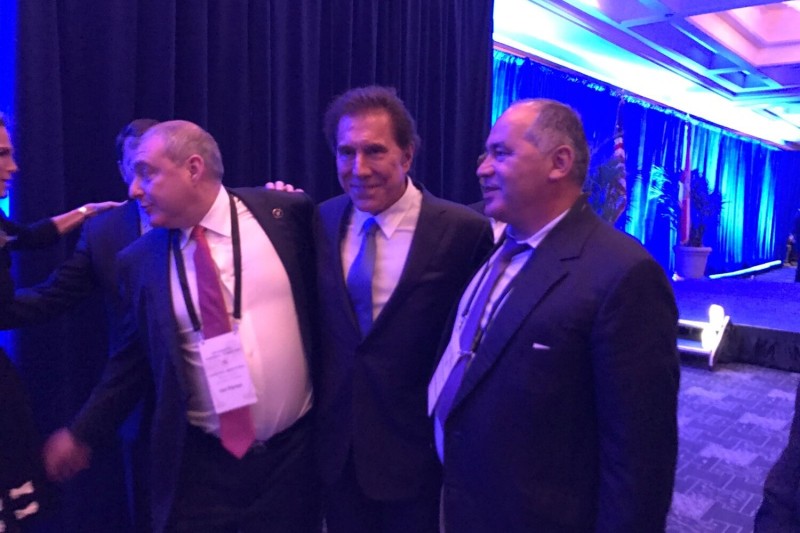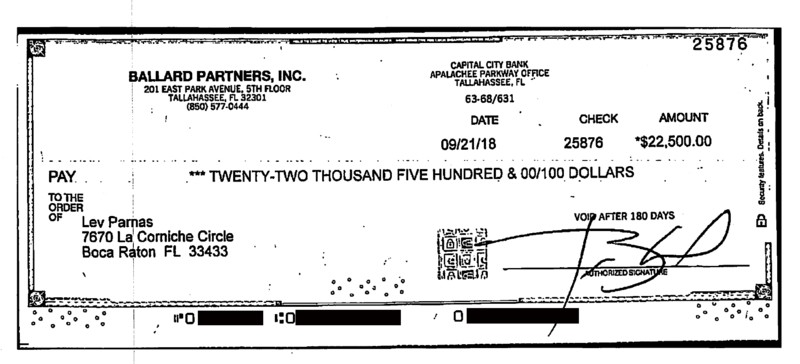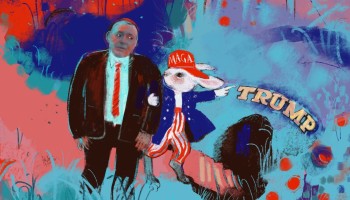It was the day before Donald Trump’s inauguration and, over lunch at Washington’s Watergate Hotel, a foreign government was trying to break into the new U.S. administration.
Meeting for the first time to talk business were Mevlüt Çavuşoğlu, Turkey’s foreign minister, and Brian Ballard, a powerful lobbyist then serving as vice chairman of Trump’s inaugural committee.
Also present were the two men who set up the meeting. One was Lev Parnas, a colorful Florida businessman whose backchannel dealings in Ukraine would, nearly three years later, lead to Trump’s impeachment. The other was Mübariz Mansimov, a Turkish-Azerbaijani shipping magnate now on trial in Turkey on terrorism charges.
The meeting on January 19, 2017, which has never before been disclosed, was key to building a close relationship between the administrations of Trump and Turkish President Recep Tayyip Erdoğan. It has perhaps been the most successful foreign lobbying effort of the Trump presidency — no mean feat for an administration mired from the beginning in foreign influence scandals.
On the agenda were what would become two multi-million-dollar contracts to lobby for Turkey and its Islamist leader, Erdoğan, in the U.S. For Parnas, one of the middlemen, it also represented a potential payday. In response to reporters’ questions, Ballard Partners said in a statement that lobbying was not discussed at the Watergate meeting.
“There was a lot of bodyguards, Turkish bodyguards,” Parnas recalled in an interview. “It was in a little restaurant. We went in. [Çavuşoğlu] was sitting in the restaurant with a couple of other Turkish dignitaries.”
“Mübariz introduced Brian Ballard as ‘Trump’s number one guy,’” Parnas said of the top Trump fundraiser from Florida, whom Politico dubbed “The Most Powerful Lobbyist in Trump’s Washington.”
The warm relationship that followed would see Trump administration officials, and the president himself, make decisions that baffled advisers who believed they put Erdoğan’s interests over America’s.
In a recent memoir, Trump’s former national security adviser, John Bolton, described a “bromance” between the two leaders.
But behind that bromance is a deeper story — one that involves Russia-linked oligarchs, alleged crooks, and key players in Trump’s Ukraine impeachment scandal, an investigation by OCCRP, Courthouse News Service and NBC News has found.
Lev Parnas — A Figure from Trump’s Impeachment
Reporters discovered that Turkey built much of its relationship via an international network of businessmen and oligarchs, most of whom are linked to former Soviet republics — and nearly all of whom are now either in jail or facing serious criminal charges.
The lobbying contracts with Ballard were established with the help of both Parnas and the shipping tycoon Mansimov, as well as Farkhad Akhmedov, who is listed by the U.S. Treasury as a Russian oligarch closely tied to Russian President Vladimir Putin. Neither Mansimov nor Akhmedov responded to requests for comment.
The contracts eventually included a $125,000-per-month deal for Ballard’s firm to represent Halkbank, a Turkish state bank being prosecuted in the U.S. for fraud, money laundering and sanctions busting, public records show. Trump has reportedly tried to quash the Halkbank case.
Parnas was paid $45,000 for setting up the deals. He now characterizes that money as a hush payment from Ballard. Ballard Partners denies this.
The Ballard contracts were part of a broader pattern of Turkish influence. The deal between Ballard and Turkey overlapped with earlier, widely reported efforts in which Turkish businessmen and ministers illegally hired another Trump’s former national security advisors, Ret. Gen. Mike Flynn, as a lobbyist, and discussed a $10 million influence campaign with another Trump adviser.
Both the shipping magnate, Mansimov, and one of the businessmen who had met Flynn were also during this time in partnerships with an Armenian-American gangster convicted in the U.S. of a $511-million fraud scheme with members of a Mormon polygamist sect. A federal agent with the IRS has alleged in court that the fraudsters were directly linked to Erdoğan and had bought the protection of Turkey’s government.
In response to detailed questions, Turkey’s ambassador to the United States, Serdar Kılıç, said: “Turkey’s dealings with U.S. lobbying firms have always been in total agreement with U.S. legal requirements.”
Talking Turkey
According to Parnas, his introduction to shipping tycoon Mansimov came via another figure who had worked with Giuliani on his Ukraine dirt-digging missions: Belarusian-born Florida businessman Igor Fruman. The encounter happened on December 5, 2016, during a rowdy night at Buddha-Bar, a flashy, Asian-themed nightclub Fruman co-owned in the center of Ukraine’s capital, Kyiv.
Born in Soviet-era Ukraine and raised in Brooklyn, Parnas was at the time a relatively unknown businessman with a string of failed ventures and unpaid debts. During the 2016 campaign, Parnas had managed to raise enough money to become a major donor to pro-Trump causes from his home in South Florida, where he moved among the local Russian-speaking Jewish community. When Trump won in November 2016, Parnas found himself with an inside track to the next White House.
According to Parnas, his conversation with Mansimov at Buddha-Bar turned to his relationship with Ballard, who was already seen as an influential power broker in Trump’s world. That October, Parnas had met Ballard at a South Florida function for V.I.P. Trump donors, where the two men “clicked,” he said. Mansimov wanted an introduction.
A photograph from the night out in Kyiv shows the men in high spirits, arm in arm as Mansimov throws the hand sign of the Grey Wolves, an ultra-right-wing Turkish militant group. According to Parnas, Mansimov touted his personal links to Erdoğan, including his reported gift of a $25-million oil tanker to the Turkish president’s family.
“He used to brag that he was very well connected to Erdoğan,” Parnas said.
“[Mansimov] told me that even Erdoğan and some of his people used his private planes to travel.”
Mansimov now sits in a Turkish jail, facing what he says are trumped up charges of involvement with Fethullah Gülen, a Turkish cleric living in exile in the U.S. who Erdoğan’s government claims is behind a 2016 coup attempt.
But on that winter night in Kyiv, Mansimov was still an influential figure. His company, Palmali, was a major shipper of oil across the Black Sea, and he enjoyed high-level connections in Turkey, Russia, and his native Azerbaijan.
As with Ballard, Parnas “clicked” with Mansimov on their evening out, he said. Their next meeting would be in Washington, D.C.
With Mansimov on his way to the U.S. capital, Parnas asked Ballard for invitations for both of them to attend a string of V.I.P. inauguration balls around the city. Parnas said Ballard gave them the tickets for free.

“Brian [Ballard] made it happen. He was remarkable,” Parnas said.
Ballard Partners denies helping Parnas obtain inauguration event tickets.
Photographs published online by Mansimov and his firm, Palmali, show he attended at least two V.I.P. events. In one picture, he can be seen posing with Parnas; in another, he is standing in front of Trump.
‘It Wasn’t a Bad Gig’
Two days after Trump’s inauguration, the world’s second-largest expedition yacht, the Luna, pulled into a mooring in Miami. The ship belonged to the Russian oligarch, Akhmedov.
Like Mansimov, Akhmedov was born in Azerbaijan and had risen in Russia to become a key businessman in the power structure of President Vladimir Putin.
The superyacht stayed at Miami’s Museum Park for months as Akhmedov criss-crossed the country.
Akhmedov has publicly claimed to have helped resolve international disputes between Turkey and Russia at least twice. In a 2016 interview with Russian state media outlet Sputnik, Turkish Foreign Minister Çavuşoğlu described Akhmedov as a valuable diplomatic go-between “who has worked closely with Putin and knows Putin well.”
After arriving in Florida, he also took up a role in mediating relations between the U.S. and Turkey.
Parnas joined Akhmedov on his $500-million superyacht after being tasked by Mansimov with entertaining the oligarch.
“It wasn’t a bad gig,” Parnas recalled with a laugh. “I mean, it was a 385-foot boat! I mean, 70 people on staff, four chefs, every toy in the book.”
Parnas said Akhmedov had high hopes for the start of a new relationship with Ballard. According to Parnas, he and Ballard then introduced Akhmedov to Steve Wynn, a casino billionaire and G.O.P. megadonor. (Ballard Partners denies this.)
Parnas said he made that introduction at Republican National Committee retreat in Palm Beach, Florida, on March 4. A photo obtained by reporters shows the three men embracing each other at the event. Trump had been there the day before, attending the first day of the event, where he reportedly pleaded for donations from well-heeled supporters. A lawyer for Wynn, Reid Weingarten, said it was possible that the men took a photo together, but that Parnas and Akhmedov are “strangers” to Wynn.
Days later, on March 8, Parnas flew with Akhmedov on his private jet to Washington, D.C. The trip, he said, was to meet Ballard.
On May 11, 2017 — just days before a notorious incident in which Erdoğan’s bodyguards beat protesters on a Washington street — Ballard Partners signed its first Turkey-related lobbying contract, with the country’s government. The second contract, with Halkbank, was signed in August. Combined, the two contracts brought in more than $4 million. (Ballard terminated the contract with the Turkish government on November 15, 2018, a few days after the Trump administration gave sanctions relief letting Erdogan’s regime purchase oil from Iran. The firm’s Halkbank contract was terminated in October 2019, after the bank was indicted by U.S. federal prosecutors.)
In a statement, Ballard Partners noted that its agreement with Turkey was signed seven months before Akhmedov was placed on the U.S. Treasury list in January 2018.
Text messages also show that Akhmedov played a role in discussions over a later Ballard Partners contract, signed in April 2018, to lobby on behalf of Azerbaijan’s authoritarian government for $50,000 per month. Ballard Partners denies this.
Even though Parnas had tried to make himself useful, he said he was soon iced out of the Turkey-Ballard relationship.
Parnas only found that Ballard and Turkey had signed a deal after reading a May 2017 [article](https://www.politico.com/states/florida/story/2017/05/22/amid-complicated-relations-with-us-turkey-hires-longtime-trump-lobbyist-brian-ballard-112221 https://drive.google.com/file/d/19ML0Nmkl-Rnu3Y7P2LA-MbPYyVdj_KG6/view?usp=sharing) in Politico. Text messages seen by reporters showed that Parnas questioned Ballard and another of his employees about it in early June.
Parnas said that Ballard, when confronted, attempted to minimize his role in setting up the contracts. “We got into a heated argument. He realized that I wasn’t gonna just take ‘no’ for an answer, and he decided to pay me something,” he said.
Bank records obtained by reporters show Ballard’s lobbying firm, Ballard Partners, made two payments of $22,500 each to Parnas in 2018, over a year after he had helped set up the deal.
“He wanted to make sure that, you know, that [the story] gets, I guess, buried,” Parnas said. Ballard Partners told reporters that Parnas was paid in a “timely manner” and only for facilitating the contract with the Turkish government, not Halkbank.
‘A Convoy of Three Cars with Bodyguards’
Keeping things quiet was probably smart. As it turns out, some of those behind the lobbying deal were connected to a foreign influence scandal that had already hit the Trump administration.
In early 2017, it had been revealed that Trump’s former national security adviser Michael Flynn — who was forced to resign on February 13 that year over undeclared contacts with Russia’s ambassador to the U.S. — had been secretly hired as an undeclared foreign agent by Erdoğan’s government.
American federal prosecutors have since indicted a Turkish-Dutch businessman, Ekim Alptekin, over his alleged role in the scheme, which involved funneling over $500,000 in Turkish government money to Flynn’s consultancy. Prosecutors allege the scheme was directed by two Turkish ministers. Lobbying documents show they were Foreign Minister Çavuşoğlu and Erdoğan’s son-in-law, Berat Albayrak, who at the time was energy minister.
As part of that effort, Flynn and those same Turkish figures also discussed kidnapping Erdogan’s cleric rival, Gülen, from his home in Pennsylvania and “whisking” him to Turkey to face charges, former C.I.A. Director Michael Woolsey, who was at the September 2016 meeting, told the Wall Street Journal. Flynn has denied the report.
In a meeting on September 20, 2016, Woolsey, then also a Trump campaign adviser, said he met Alptekin and his close associate, Sezgin Baran Korkmaz, to unsuccessfully pitch his own $10-million plan to help Turkey by discrediting Gülen.
Korkmaz faces allegations that he played a key role in a half-billion-dollar fraud scheme orchestrated by Lev Aslan Dermen, an Armenian-American organized crime figure. Dermen was convicted earlier this year, and was alleged in court proceedings to be personally linked with Erdoğan.
Also closely tied to the two men was Mansimov. Photographs published online show all three — Mansimov, Dermen, and Korkmaz — attended a wedding together in Turkey in early November 2016, within days of the U.S. election.
At the time they were involved in brokering U.S.-Turkey relations, both Mansimov and Korkmaz were also partners in business with the Armenian-American organized crime figure.
A $500-Million Fraud, a Mormon Polygamist Sect, and Erdoğan
Parnas also said he was vaguely aware of a business relationship between Dermen and Mansimov, and said Mansimov had introduced him to the organized crime figure.
According to Parnas, he and Akhmedov, the Russian oligarch, flew to Las Vegas in early February 2017, and were put up by Dermen at the hotel owned by Wynn. There is no indication that Wynn had any involvement with Dermen. Parnas said Dermen was not present, but sent his entourage to greet them instead.
Dermen then invited Parnas and his wife to Los Angeles, where the businessman said he and his family were treated “like celebrities.”
“He picked me up with a convoy of three cars with bodyguards,” Parnas said of Dermen. “It’s something I’m used to seeing in Ukraine and Russia and other places. Not in Beverly Hills, California.”
A lawyer for Dermen declined to comment.
‘Best International Buddies’
The upshot of Turkey’s outreach has been a Trump administration that has often been strikingly receptive to the interests of Erdoğan’s authoritarian government.
In his time serving as Trump’s national security adviser, Bolton wrote in his recent memoir, the U.S. president seemed, despite a rocky bilateral relationship, to regard the Turkish leader as one of his “best international buddies.”
Records filed under the U.S. Foreign Agents Registration Act show that Turkey’s government and related agencies have spent more than $7.3 million on five U.S. lobbying firms in 2018 alone. Apart from Ballard, one major beneficiary has been Mercury Public Affairs, another outfit that enjoys close links to the administration.
Mercury has contracts with Turkey’s government and the Turkish-U.S. Business Council, a semi-official Turkish body that was previously headed by Alptekin, the businessman currently under indictment for his alleged role in secretly recruiting Flynn.
The council is now headed by Mehmet Ali Yalçındağ, a Turkish businessman who partnered with the U.S. president in the Trump Towers Istanbul project. Trump described the development in 2015, without elaboration, as a “little conflict of interest”. Yalçındağ reportedly enjoys a close relationship with the Trump family.
Among Trump’s moves in Erdoğan’s favor, according to Bolton, was a push to drop the prosecution of Ballard’s client, Halkbank. The case, which involved laundering billions of dollars out of Iran, in violation of U.S. sanctions, implicates Erdoğan and his finance minister son-in-law, Albayrak.
Bolton described one incident where Erdoğan handed Trump a dossier from the bank’s lawyers absolving it of any wrongdoing. According to Bolton, Trump flipped through the document before declaring he believed it.
Trump, Bolton wrote, “told Erdoğan he would take care of things, explaining that the Southern District [of New York] prosecutors were not his people, but were Obama people, a problem that would be fixed when they were replaced by his people.”
Text messages supplied by Parnas also give a hint that the money launderer's case was a priority for Turkey.
On January 22, 2017, just days after the meeting at the Watergate, Mansimov sent Parnas a text message that simply contained the words “Riza Zarrab,” using another spelling for his name. According to Parnas, this was Mansimov restating what he saw as Turkey’s key priority in the deal.
Erdoğan’s persuasive power was also on display last October, when a phone call with Trump led the U.S. president to suddenly announce he was greenlighting a Turkish invasion of northern Syria. The chaotic U.S. troop withdrawal that resulted from that decision was criticized across the political spectrum, and many saw it as an abandonment of America’s Kurdish allies.
Carl Bernstein, a veteran journalist who helped break the Watergate scandal that brought down Richard Nixon, reported in June that Erdoğan has enjoyed a level of telephone access to the U.S. president unrivaled by any other foreign leader.
“By far the greatest number of Trump's telephone discussions with an individual head of state were with Erdogan, who sometimes phoned the White House at least twice a week and was put through directly to the President on standing orders from Trump,” Bernstein wrote.
Clarification: This story was amended to reflect the fact that Ballard Partners denies that Brian Ballard introduced Farkhad Akhmedov to Steve Wynn.
Additional reporting by Kelly Bloss, Dada Lyndell, and Yanina Korniienko (OCCRP), and Andrew W. Lehren and Dan De Luce (NBC News)
